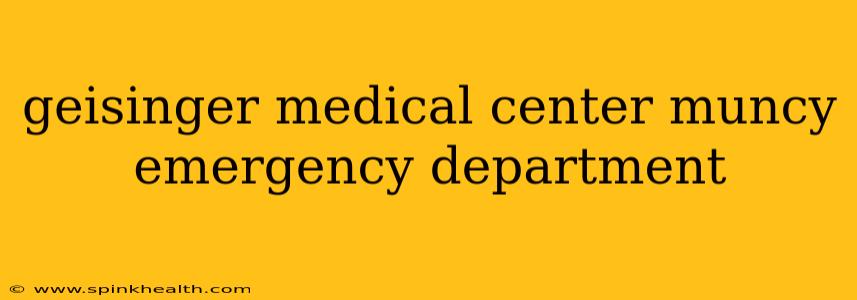The unexpected can happen anytime, anywhere. A sudden illness or injury can leave you feeling lost and overwhelmed, searching frantically for reliable and immediate medical attention. If you find yourself in this situation in the Muncy area, the Geisinger Medical Center Muncy Emergency Department is there to provide critical care. But what exactly can you expect? This guide will walk you through everything you need to know about Geisinger Muncy's emergency services, answering common questions and ensuring you're prepared for any urgent situation.
What Services Does Geisinger Muncy ED Offer?
Geisinger Muncy's Emergency Department provides comprehensive emergency medical services, catering to a wide range of urgent and critical needs. From minor injuries like sprains and lacerations to life-threatening conditions such as heart attacks and strokes, their team of skilled medical professionals is equipped to handle it all. They offer rapid assessment, stabilization, and treatment, ensuring you receive the necessary care promptly. Beyond immediate treatment, they also facilitate transfers to other Geisinger facilities for specialized care if required. This ensures a seamless transition for patients needing more advanced medical attention.
What are the Wait Times Like at Geisinger Muncy ED?
This is a question on many minds, and understandably so. Wait times at any emergency department can vary greatly depending on several factors. These include the number of patients currently being treated, the severity of their conditions, and the availability of staff. While Geisinger Muncy strives to provide timely care, it's important to understand that wait times can fluctuate. Factors like the time of day or day of the week can also influence how long you might wait. If you are experiencing a non-life-threatening emergency, it's often a good idea to call ahead if possible to get an estimate of the current wait time. Remember that emergencies are prioritized, and those with the most critical needs will always receive immediate attention.
What Should I Bring to the Geisinger Muncy Emergency Room?
Being prepared can significantly ease the stress of an emergency visit. It's recommended to bring your insurance card, photo ID, and a list of your current medications, including dosages. If possible, bring a list of your known allergies as well. Having this information readily available helps the medical team provide you with the most efficient and effective care. In addition, bringing any relevant medical history documents can prove beneficial.
Does Geisinger Muncy ED Accept My Insurance?
Geisinger Medical Center participates in a wide range of insurance networks. It's always best to verify your insurance coverage with Geisinger directly before your visit to avoid any unexpected billing surprises. You can typically find this information on their website or by contacting their patient services department. They can confirm whether your specific plan is accepted and what your co-pay or deductible might be.
What if I Don't Have Insurance?
Geisinger offers financial assistance programs for patients who lack insurance or cannot afford the cost of their care. They work with patients to create manageable payment plans and explore various options to ensure access to necessary medical services, regardless of financial limitations. Don't hesitate to discuss your financial concerns with the hospital's financial assistance team; they are there to help you navigate the process.
How Can I Contact Geisinger Muncy ED?
For non-emergency inquiries or to check on wait times (where possible), you can contact Geisinger Muncy's main number. Remember that for life-threatening emergencies, it's always best to call 911 immediately.
This comprehensive guide aims to equip you with the necessary information regarding Geisinger Muncy's Emergency Department. While unexpected situations can be stressful, being informed can help you navigate the process with greater ease and confidence. Remember that the dedicated team at Geisinger Muncy is committed to providing you with the best possible emergency medical care.

